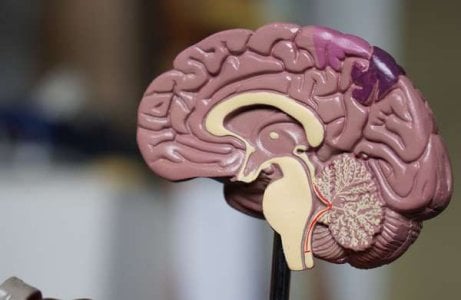Groundbreaking discovery! New Alzheimer's drug could halt disease progression, but are there risks involved?
The world of medical advancements never ceases to amaze us, and we have some exciting news for you today.
As you probably know, Alzheimer's is a harrowing disease that can be devastating for those affected and their loved ones.
But every cloud has a silver lining. Scientists have recently surfaced with a potential game-changer—Donanemab.
Eli Lilly and Co, an American pharmaceutical company, has applied to the United States Food and Drug Administration seeking approval for the new drug.

If this cutting-edge treatment receives the green light, it'll be the second Alzheimer's therapy shown to delay the progression of this devastating brain disease, which, considering the eye-watering affliction Alzheimer's has on millions globally, is a very big deal.
The only other drug that has managed to achieve this feat so far is Leqembi, produced by Japanese drug stalwart Eisai.
'Finally there's some hope, right, that we can talk about,' elatedly mentioned Lilly's Dr John Sims during the Alzheimer's Association International Conference held in Amsterdam.
'Diabetes doesn't have a cure either—it doesn't mean you can't have very meaningful treatments for patients,' he added.
The full results of a trial involving roughly 1,700 participants were recently shared by Lilly, and those findings were certainly interesting.
Both Donanemab and Leqembi, which are lab-engineered antibodies, target a key factor in Alzheimer's: sticky amyloid protein buildup in the brain.
However, nothing comes without a price, and these two promising contenders are no different.
Both drugs are linked with a sobering safety concern, brain swelling or haemorrhage, which in Lilly's study, contributed to three deaths.
According to scientists, although these drugs signify a new era in Alzheimer's therapy, significant questions still linger regarding which patients should consider them and the extent of the benefits they will experience.

Dr Eric Widera of the University of California, San Francisco, wrote in a JAMA editorial accompanying Lilly's new data, ‘The modest benefits would likely not be questioned by patients, clinicians or payers if amyloid antibodies were low risk, inexpensive and simple to administer. However, they are none of these.’
Patients aged from 60 to 85 in the early stages of Alzheimer's constituted the participants in Lilly's study.
Half of them received monthly infusions of Donanemab, while the other half were given dummy infusions for 18 months.
Here's where things get particularly intriguing, though. If enough amyloid was cleared out from the patients' brains during the process, those patients would then be switched to dummy infusions.
Moreover, the researchers tracked another villainous protein in this saga: abnormal tau, whose increase signifies a more advanced disease stage in the brain.
Twisting and turning through the maze of this groundbreaking study, we find that both patient groups showed signs of the disease's progression.
However, overall, it appeared that those administered Donanemab deteriorated about 22 per cent more slowly, and the drug seemed to perform better in earlier stages of the disease.
In a tangible sense, this interpretation means that Donanemab could potentially slow patients' deterioration by around four to seven months.

Safety concerns certainly exist regarding brain swelling or bleeding, but there is a glimmer of hope in stopping or temporarily halting Donanemab treatment in patients who respond well to it.
Still, at this point, it's early days, and with around 90 per cent of the study's participants being of Caucasian descent, researchers are missing crucial data on how different ethnic groups might respond.

Nevertheless, with the recent approval of Leqembi and the promising data for Donanemab, it's certainly brought a fresh flicker of promise in the race against Alzheimer's.
Remember that this news shouldn’t act as a recommendation to change your treatment plans. Before making any decision about your health, consult with your healthcare professionals.
What are your thoughts on the potential Alzheimer's drug? Are you optimistic about its potential benefits, or are you concerned about the safety risks? Share your opinions with us!
As you probably know, Alzheimer's is a harrowing disease that can be devastating for those affected and their loved ones.
But every cloud has a silver lining. Scientists have recently surfaced with a potential game-changer—Donanemab.
Eli Lilly and Co, an American pharmaceutical company, has applied to the United States Food and Drug Administration seeking approval for the new drug.

Alzheimer's is a progressive neurological disorder primarily affecting memory, thinking, and behaviour. Image by averey from Unsplash
If this cutting-edge treatment receives the green light, it'll be the second Alzheimer's therapy shown to delay the progression of this devastating brain disease, which, considering the eye-watering affliction Alzheimer's has on millions globally, is a very big deal.
The only other drug that has managed to achieve this feat so far is Leqembi, produced by Japanese drug stalwart Eisai.
'Finally there's some hope, right, that we can talk about,' elatedly mentioned Lilly's Dr John Sims during the Alzheimer's Association International Conference held in Amsterdam.
'Diabetes doesn't have a cure either—it doesn't mean you can't have very meaningful treatments for patients,' he added.
The full results of a trial involving roughly 1,700 participants were recently shared by Lilly, and those findings were certainly interesting.
Both Donanemab and Leqembi, which are lab-engineered antibodies, target a key factor in Alzheimer's: sticky amyloid protein buildup in the brain.
However, nothing comes without a price, and these two promising contenders are no different.
Both drugs are linked with a sobering safety concern, brain swelling or haemorrhage, which in Lilly's study, contributed to three deaths.
According to scientists, although these drugs signify a new era in Alzheimer's therapy, significant questions still linger regarding which patients should consider them and the extent of the benefits they will experience.

It is the most common cause of dementia, a group of cognitive impairments that interfere with daily functioning. Image from Shutterstock
Dr Eric Widera of the University of California, San Francisco, wrote in a JAMA editorial accompanying Lilly's new data, ‘The modest benefits would likely not be questioned by patients, clinicians or payers if amyloid antibodies were low risk, inexpensive and simple to administer. However, they are none of these.’
Patients aged from 60 to 85 in the early stages of Alzheimer's constituted the participants in Lilly's study.
Half of them received monthly infusions of Donanemab, while the other half were given dummy infusions for 18 months.
Here's where things get particularly intriguing, though. If enough amyloid was cleared out from the patients' brains during the process, those patients would then be switched to dummy infusions.
Moreover, the researchers tracked another villainous protein in this saga: abnormal tau, whose increase signifies a more advanced disease stage in the brain.
Twisting and turning through the maze of this groundbreaking study, we find that both patient groups showed signs of the disease's progression.
However, overall, it appeared that those administered Donanemab deteriorated about 22 per cent more slowly, and the drug seemed to perform better in earlier stages of the disease.
In a tangible sense, this interpretation means that Donanemab could potentially slow patients' deterioration by around four to seven months.

The disease typically starts with mild memory loss and progresses to severe cognitive decline, impacting various aspects of a person's life, including communication, decision-making, and self-care. Image from Shutterstock
Safety concerns certainly exist regarding brain swelling or bleeding, but there is a glimmer of hope in stopping or temporarily halting Donanemab treatment in patients who respond well to it.
Still, at this point, it's early days, and with around 90 per cent of the study's participants being of Caucasian descent, researchers are missing crucial data on how different ethnic groups might respond.
Key Takeaways
- Eli Lilly and Co are seeking Food and Drug Administration approval for Donanemab, a potential treatment for Alzheimer's disease. It would be only the second Alzheimer's treatment convincingly demonstrated to delay the progression of the disease.
- Donanemab and the recently approved Leqembi target sticky amyloid buildup in the brain but come with a serious safety concern—brain swelling or bleeding. This was linked to three deaths in the Lilly study.
- In trials, the tested drug Donanemab showed it could slow the disease's progression by about four to seven months. This effect seems to be more profound in the early stages of Alzheimer's.
- There are growing questions about which patients should be recommended these treatments, their actual benefits, and the potential for serious side effects. More than 90 per cent of the study's participants were Caucasian, leaving little data on the effects on other populations.
Nevertheless, with the recent approval of Leqembi and the promising data for Donanemab, it's certainly brought a fresh flicker of promise in the race against Alzheimer's.
Remember that this news shouldn’t act as a recommendation to change your treatment plans. Before making any decision about your health, consult with your healthcare professionals.
What are your thoughts on the potential Alzheimer's drug? Are you optimistic about its potential benefits, or are you concerned about the safety risks? Share your opinions with us!







